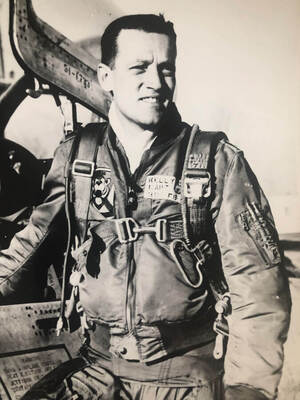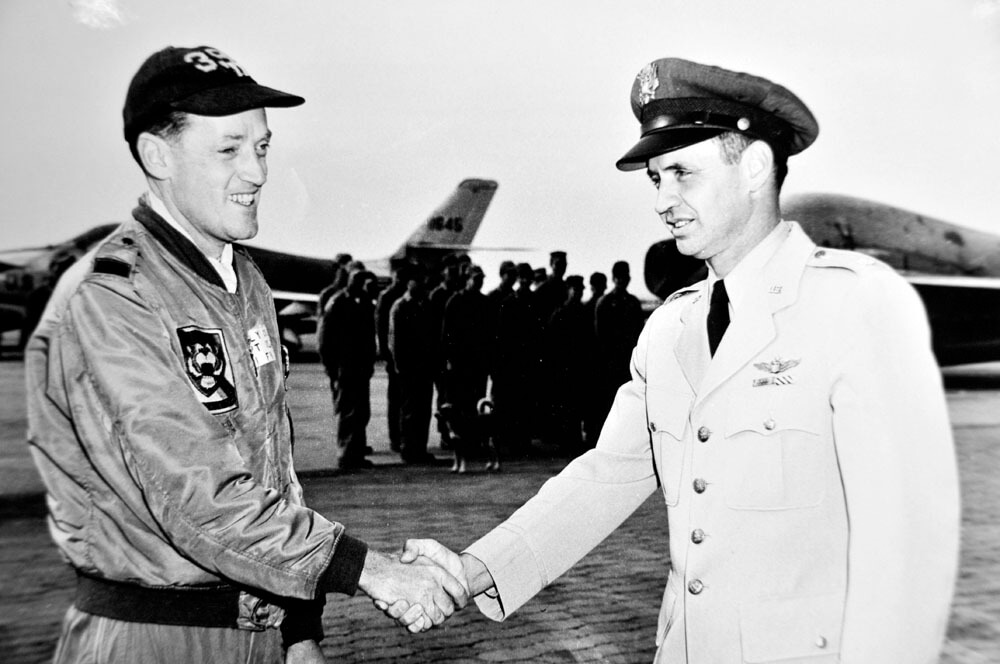
Five-year-old Brian Cook was happily playing in his front yard when two uniformed officers pulled up to the curb. Brian usually loved seeing military men with their shiny medals and ironed outfits, but something seemed odd to him about this pair.
When his mother, Joanne, invited the men inside, they informed her that her husband, Lt. Col. Kelly Cook ’47, was missing in action following a November 10, 1967, bombing mission over North Vietnam.
Many other fliers were shot down in Vietnam, but few could lay the same claim as Cook — he had jumped into American aircraft to fight for his country in three separate wars.
Born in Kentucky in 1922, Kelly Francis Cook — buttressed by his parents’ strong Catholic faith and emphasis on education — loved reading, hard work and flying. Before he finished high school, he was piloting crop dusters over Kentucky fields.
In September 1940, Cook arrived as a freshman at the University of Notre Dame. He readily fit in, writing feature stories and poetry for The Notre Dame Scholastic, a literary magazine called Scrip and other campus publications. He was editor-in-chief of the Dome yearbook of 1942 and wrote a narration read during the debut of “The Spirit of Notre Dame,” a choral symphony first performed by the Glee Club in spring 1943. “He was always so proud to have gone to ND and remained a faithful alum for the rest of his life,” Brian Cook says.
After the Japanese attack on Pearl Harbor in December 1941, Cook enrolled in the Aviation Cadet Program at Notre Dame. With his prior flight experience, he felt he could help fill a crucial need the United States military faced for skilled pilots.
Cook continued his studies at Notre Dame until February 1943, when he left campus to train with the U.S. Army Air Forces. In Tucson, Arizona, Kelly fell in love with Joanne Joyce Brault. “Their relationship was passionate and strong,” their daughter Maureen explains. “I have a photo of them dancing on the lawn at an evening party just a few years before my father left for Vietnam. They looked like they were young lovers still.”
As part of the 15th Air Force, 1st Lt. Cook flew B-24 bombers on 25 missions over Germany and northern Italy during World War II. He treated his crew with respect and went out of his way to improve their spartan living quarters.
When the war in Europe ended in May 1945, Cook’s service was complete. He and Joanne married the following month. The young veteran returned to South Bend in 1946 and graduated from Notre Dame in 1947. The commencement ceremony was held in the Navy Drill Hall, a focal point of campus life and military training during the war. (Although Cook finished his studies in 1947, he identified with the Class of 1944.)
That September, Cook was hired as an instructor in the English department, a position he held for two years. During his employment at the University, Cook, his wife and their firstborn daughter, Nancy, lived in a single family home on North Eddy Street. In May 1949, the Cooks welcomed their second child, Marilyn.
One month later, he left for a post with the Iowa Air National Guard, and in 1951, he was called to duty in a second conflict — the Korean War. For the next year, he flew an F-84F Thunderstreak fighter-bomber from several bases before serving as a 5th Air Force staff officer at Osan Air Base, Korea.
Preparing him for future assignments, the Air Force funded Cook’s postwar graduate studies at the University of North Carolina, where he earned a master’s degree in English in 1959.
After a string of military assignments, including a brief stint as a squadron commander and instructor at the Royal Air Force College in Cranwell, England, Cook in 1967 received orders to report for combat duty in Vietnam. At the time, he was studying for a doctoral degree. He joined the 366th Tactical Fighter Wing, based at Da Nang, where he served as assistant director of operations.

Late in the afternoon of November 10, Cook and 1st Lt. James A. Crew lifted off from Da Nang in their F-4C Phantom fighter. Accompanied by a second Phantom, the duo were ordered to bomb targets in North Vietnam. A few seconds after the pilots were to release their bombs, the controller at Da Nang lost radar contact. When radio calls went unanswered, the controller alerted search and recovery forces, but limited visibility over an area bristling with enemy antiaircraft fire ruled out a thorough search.
Faulty bomb fuses had caused premature detonation of bombs in other circumstances, so it is possible one ignited just as Cook’s Phantom released it. Military authorities believed Cook ejected from the aircraft and was either captured or perished in the next few days. While he was missing in action, he was promoted to the rank of colonel.
For almost a decade, Joanne and the couple’s six children — sisters Nancy, Marilyn, Kathleen and Maureen and brothers Brian and Daniel — continued to hope that Cook would return. A sliver of optimism surfaced during Operation Homecoming in 1973, which brought home almost 600 American prisoners of war held by North Vietnam. Kelly Cook was not among them.
In 1976, as no further information had been received since his disappearance, the Air Force determined it was no longer reasonable to assume Cook was alive. His status was changed from missing in action to deceased. “We realize the sorrow you must feel at this time,” concluded a letter from the Air Force to Joanne, “and want you to know that your loss is shared by the Air Force. We are continuing our efforts to secure the necessary facts which may lead to the recovery and identification of the remains of all our personnel lost in Southeast Asia.”
Cook had been in Vietnam for one month when his plane was lost. His remains were never recovered.
Friends of the family arranged a memorial for Cook at the chapel of the Air Force Academy near Colorado Springs, Colorado. Following a Catholic service, a bugler played taps just before Air Force pilots thundered overhead in a “Missing Man” formation. A rifle team conducted a 21-gun salute.
Twenty-five years later, the Air Force provided new details. During Cook’s nighttime mission, the two Phantom aircraft were destroyed over North Vietnam. Cook ejected and was captured along with one other airman. Two others died during the downing, and Cook succumbed from his wounds within days.
Besides the support offered by Air Force friends, the family received a boost from fellow Notre Dame graduates, who reached out with prayers and offers of assistance. Classmates stopped by the Cooks’ house in Colorado Springs to see how Joanne and the children were faring until her death in 2016. She was buried in Colorado Springs alongside her husband’s memorial marker.
The Cook family is proud that others remember their father. They appreciate the Man of the Year Award bestowed on their late father by the Notre Dame Club of Albuquerque, and relish the words of Dorothy Shields, who — like thousands of other Americans — wore a prisoner of war bracelet for many years, hers bearing the name of Col. Kelly Cook. Shields posted on a Facebook page on Veterans Day 2021: “I have worn mine for over 50 years. I got it in 1970. To this day it is a part of who I am.”
The family’s pain recedes when they reflect on their father’s legacy — the example of a person who placed family, country and faith above all else. “Our mother always told me that he loved serving his country and was proud to be an American,” Brian recently wrote. “She also told me that he often said that if he died in the service of his country, it would have been how he wanted it, and that he would die doing what he loved. This always inspired me to follow his example and serve our country as best I could, which is probably the biggest reason I became a special agent and federal law enforcement officer.”
“Kelly Cook was a man of faith,” Maureen says. “He loved his country and willingly served each time he was called to service. He was immensely proud of his opportunity to study and teach at a world class Catholic educational institution. Notre Dame was his home no matter where the military asked him to serve.”
John Wukovits is a World War II historian and the author of several books, including Soldiers of a Different Cloth: Notre Dame Chaplains in World War II.